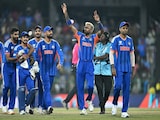There's one common denominator that brings terrorist Osama Bin Laden, nuclear weapons and djinns to the same room -- Lieutenant General Ahmed Sharif Chaudhry, the Director General of Pakistan's Inter-Services Public Relations (ISPR). Tensions between India and Pakistan have been escalating in recent weeks, forcing Lt General Chaudhry to make more media appearances than he is used to. That has put the spotlight on his family.
Lt General Chaudhry is the son of Sultan Bashiruddin Mahmood, a nuclear engineer once honoured by the Pakistani state, and later sanctioned by the United Nations for his alleged contacts with terrorist organisations, including al-Qaeda.
Read | India-Pakistan Tensions: Follow Live Updates
During his decades-long tenure with the Pakistan Atomic Energy Commission (PAEC), Mahmood played a key role in the development of Pakistan's nuclear infrastructure, contributing to the construction of uranium enrichment plants and the design of reactors necessary for Pakistan's transition from uranium to plutonium-based weapons capability. These facilities form the backbone of Pakistan's nuclear arsenal.
But it is Mahmood's post-retirement affiliations and ideological inclinations that have raised the most concerns among Western intelligence agencies.
READ | JF-17, Mirage, Drones: India's Plan Behind Choosing Pak Air Force Targets
In the early 2000s, Mahmood co-founded Ummah Tameer-e-Nau (UTN), which claimed to be an NGO operating in Taliban-controlled Afghanistan. UTN's activities included building schools and infrastructure in Kandahar. US and Pakistani intelligence later discovered that the organisation served as a cover for deeper engagements with terror networks.
According to the United Nations, Mahmood and his colleague Chaudhri Abdul Majeed met Osama bin Laden and Ayman al-Zawahiri in August 2001, weeks before the 9/11 attacks. While no conclusive evidence emerged to suggest that nuclear weapons technology had been transferred, the meetings triggered alarm in Washington and led to Mahmood's arrest and interrogation by Pakistani authorities.
READ | "Swift, Calibrated Response": Indian Fighter Jets Bomb Pak Air Force Bases
"UTN provided Usama bin Laden and the Taliban with information about chemical, biological and nuclear weapons. During UTN visits to Afghanistan, Bashir-Ud-Din met Bin Laden and Al-Qaida leaders and discussed nuclear, chemical and biological weapons. During 2001, Bashir-Ud-Din also met Mullah Omar, listed as Mohammed Omar Ghulam Nabi. During a follow-up meeting, an associate of Usama bin Laden indicated that he had nuclear material and wanted to know how to use it to make a weapon. Bashir-Ud-Din provided information about the infrastructure needed for a nuclear weapons program and the effects of nuclear weapons," the United Nations statement read.
The ISI eventually released Mahmood, claiming that he lacked the technical know-how to independently assemble a nuclear weapon.
Born in Pakistan and educated in the United Kingdom, Mahmood was conferred the Sitara-e-Imtiaz, Pakistan's third-highest civilian honour, by former Prime Minister Nawaz Sharif. Ironically, Mahmood later became a vocal critic of Sharif.
READ | Operation Sindoor Eliminated These 5 Terrorists: How Pakistan Gave Them Funeral
Mahmood's scientific writings also feature djinns, the mythical beings that feature prominently in Islamic literature. According to Mahmood, these beings are key to solving earth's energy crisis.
His son, Lt General Ahmed Sharif Chaudhry, emerged professionally through a separate channel, the Pakistan Army. Trained as an officer in the Corps of Electrical and Mechanical Engineering, Chaudhry has held various postings, including within the military operations directorate and the Defence Science and Technology Organisation (DESTO), an institution involved in Pakistan's defence research. DESTO had been subjected to US sanctions following Pakistan's nuclear tests in 1998, though these were eased after 9/11 to facilitate cooperation in the War on Terror.
READ | India Confirms Bases Attacked By Pakistan, Debunks Claims Of Heavy Damage
According to the book The Man from Pakistan by investigative journalists Douglas Frantz and Catherine Collins, Mahmood viewed Pakistan's nuclear arsenal not as an asset but as the collective property of the Muslim community. He believed that nuclear weapons should be shared with other Islamic countries, particularly those confronting the West.
The book describes a 2001 meeting in Kandahar during which Mahmood and Majeed offered technical guidance to al-Qaeda operatives.















